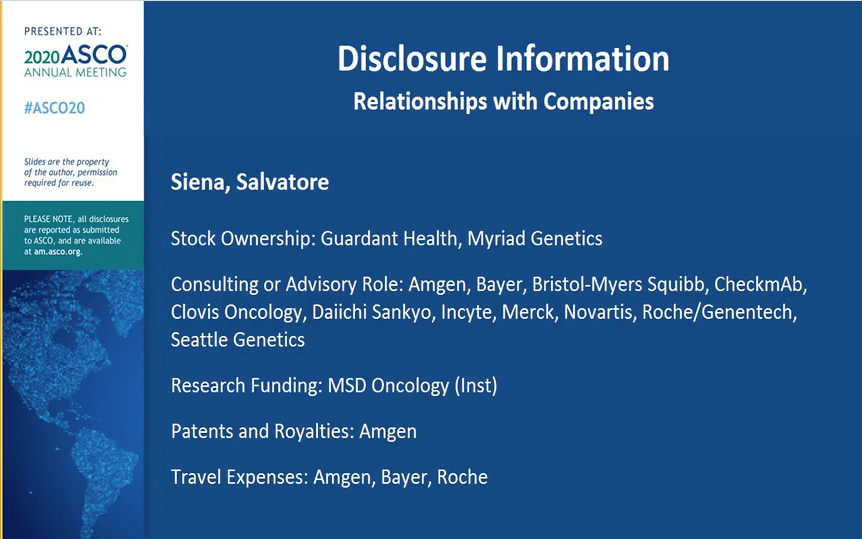https://doi.org/10.55788/5c957325
Prof. Pia Österlund (Tampere University Hospital, Finland) presented a multicentre retrospective cohort study, including patients with solid tumours who experienced fluoropyrimidine-related cardiotoxicity and were re-challenged with a different fluoropyrimidine or S-1 and then assessed for cardiotoxicity.
Cardiotoxicity during capecitabine (n=124), continuous (n=13), or bolus 5-fluorouracil (n=4) was reported for 141 patients prior to switching to S-1 therapy. Cardiotoxicity was defined as chest pain including vasospasm without cardiac findings (55%), acute coronary syndrome or myocardial infarction (32%), atrial fibrillation (4%), heart failure/cardiomyopathy (4%), tachycardia/bradycardia (3%), and/or other (15%). Grade 3-4 cardiotoxicity occurred in 55%, appeared on cycle 1-2 in 89%, and at a median 4 days (range 0-466) from fluoropyrimidine initiation. Causality was judged to be related in 26%, probable in 60%, and possible in 14%. Action with fluoropyrimidine causing cardiotoxicity was permanent discontinuation in 91%. Treatment intent was curative in 70%. Cumulative incidence of recurrent cardiotoxicity with S-1 was 3.5% (95% CI 1.2-8.4%) and median time to recurrent cardiotoxicity was 11 days (range 6-195). Out of 141 participants, 4 had grade 1 and 1 had grade 2 recurrent cardiotoxicity. S-1 was discontinued in 1 patient.
In conclusion, fluoropyrimidine-related cardiotoxicity, when encountered, is often considered severe, occurs early, and leads to permanent fluoropyrimidine discontinuation. Switching to a S-1-based therapy appears safe.
- Österlund P, et al. ASCO Virtual Meeting, 29-31 May 2020, Poster 7037.
Posted on
Previous Article
« Perioperative chemotherapy for resectable pancreatic ductal adenocarcinoma Next Article
REGOMUNE: a phase 2 study combining regorafenib and avelumab »
« Perioperative chemotherapy for resectable pancreatic ductal adenocarcinoma Next Article
REGOMUNE: a phase 2 study combining regorafenib and avelumab »
Table of Contents: ASCO 2020
Featured articles
COVID-19 & Telemedicine
COVID-19 and Cancer Consortium Registry: initial results
Oncology hospital-at-home model reduces hospitalizations, emergency department visits, and costs
Nurse-led telephone triage system reduces hospitalizations, helps patients manage symptoms at home
Melanoma
Adjuvant pembrolizumab: durable RFS for stage III melanoma
Adjuvant pembrolizumab: durable RFS for stage III melanoma
Pembrolizumab plus low-dose ipilimumab well tolerated after progression on PD1 antibody therapy
Toripalimab plus axitinib effective in metastatic mucosal melanoma
Breast & Ovarian Cancer
Advanced breast cancer: locoregional therapy does not improve OS
T-DM1 does not improve safety or efficacy in HER-2 positive early breast cancer; favorable iDFS reported
Maintenance olaparib improves OS in relapsed ovarian cancer with BRCA1/2 mutation
Combination pembrolizumab/chemo improves PFS in metastatic TNBC
Effect of veliparib with or without cisplatin in breast cancer: results of SWOG S1416
PHOEBE, a phase 3 trial comparing pyrotinib and lapatinib in HER2-positive metastatic breast cancer
BYLieve demonstrates efficacy of PIK3CA-directed treatment post CDK4/6-ihibition
Strategies emerge for chemotherapy de-escalation in HER2-positive breast cancer
Multiple Myeloma
Carfilzomib: no PFS benefit for multiple myeloma
Lung Cancer
ES-SCLC: tremelimumab + durvalumab + chemotherapy misses endpoint
Adjuvant osimertinib in NSCLC: practice changing ADAURA trial
ES-SCLC: pembrolizumab KEYNOTE-604 data
Second-line gemcitabine plus ramucirumab significantly improves overall survival
Tiragolumab and atezolizumab: ORR in NSCLC
MET-amplified advanced NSCLC responds well to MET inhibitor capmatinib
Genitourinary Cancer
Urothelial cancer: avelumab works as maintenance therapy
ARAMIS final OS and nmCRPC safety outcomes
Final survival results from phase 3 SPARTAN trial
Novel drug for kidney cancers/VHL patients
Primary analysis from IMvigor010, adjuvant atezolizumab in high risk muscle-invasive urothelial carcinoma
First randomised trial of Lu-PSMA in mCRPC progressing after docetaxel
Gastrointestinal Cancer
HER2-expressing metastatic colorectal cancer: trastuzumab deruxtecan
REGOMUNE: a phase 2 study combining regorafenib and avelumab
Cardiotoxicity: consider switching to S-1
Perioperative chemotherapy for resectable pancreatic ductal adenocarcinoma
Real-world data of sequential sorafenib followed by regorafenib in unresectable HCC
Paediatric Cancer
Sustained improvements in quality of life with larotrectinib
Promising first immunotherapy trial in placental trophoblastic tumours
Precision medicine for poor-prognosis paediatric patients
Related Articles
September 17, 2020
Cardiotoxicity: consider switching to S-1
September 8, 2020
Tiragolumab and atezolizumab: ORR in NSCLC

September 17, 2020
HER2-expressing metastatic colorectal cancer: trastuzumab deruxtecan
© 2024 Medicom Medical Publishers. All rights reserved. Terms and Conditions | Privacy Policy
HEAD OFFICE
Laarderhoogtweg 25
1101 EB Amsterdam
The Netherlands
T: +31 85 4012 560
E: publishers@medicom-publishers.com

